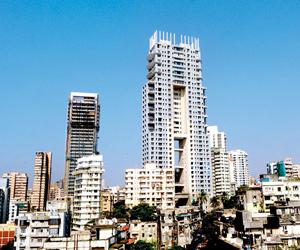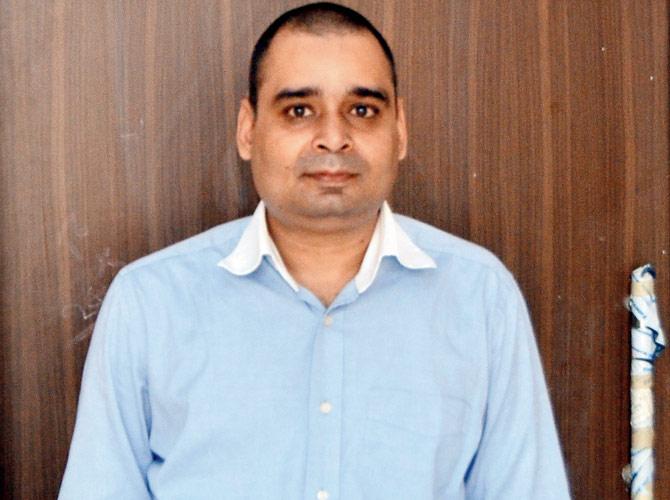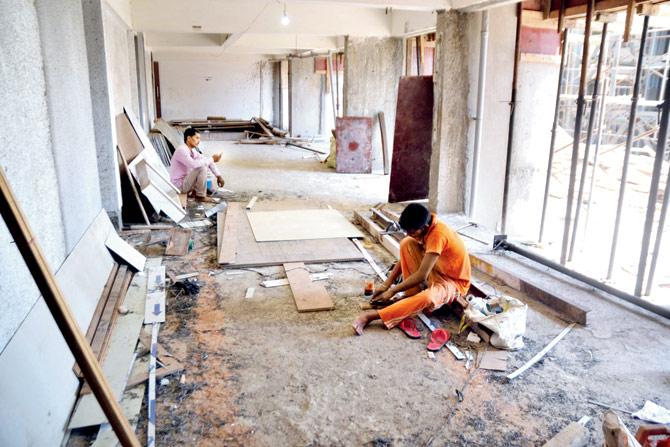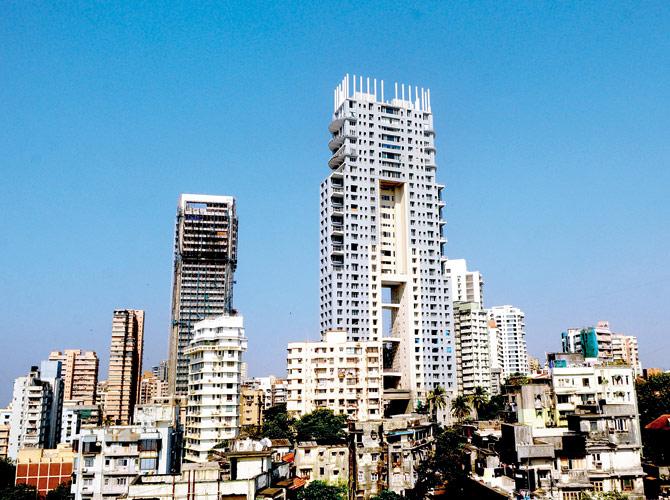As the MahaRERA court at Bandra East turns one, we spend a day making sense of the juggernaut at work that's allowing duped home buyers a chance at justice

 Justice Chatterjee
Justice Chatterjee
ADVERTISEMENT
At the Maharashtra Real Estate Regulatory Authority (MahaRERA) office in Bandra East, the customer is always king. Unlike most government offices in the state, where lunch hours are taken seriously, here, time is not wasted in indulging the ways and life of the bureaucracy. Since the implementation of the Real Estate (Regulation and Development) Act 2016 [see box] in May last year, MahaRERA — formed two months prior — listens to an average of 70 cases daily. Lawyers, who’ve experienced the grind of waiting through futile dates at civil courts, will tell you that this is a good number.
By 2.30 pm, right after lunch, hearings are already on in full swing. Harrowed residents along with an ammo of lawyers fighting against them, make their way in and out of the “court room”, presided by Gautam Chatterjee, chairman of the now, year-old authority. Some emerge elated, the others, predictably disappointed. Irrespective of the outcome, decisions are taken quickly.
When MahaRERA was first launched, it gave home-owners and buyers an opportunity to fight their battles on their own. All they had to do was register a complaint online (MahaRERA.mahaonline.gov.in) and the assurance was that the case would be heard within a month. While a year on, promises are being kept, there is also a sense of disgruntlement among those who didn’t see the result they expected. For them, the law is still not all pervasive and the teething troubles are far too many.
Many grievances, no solution
 When Nitin Sood (right) booked a flat in the Orchard Metropolis in 2016, he was told that the flat was ready for possession. During a visit to the site last year, he realised that only pillars had been constructed. Even now, work on the gym, pool and garden are far from ready. Pic/Datta Kumbhar
When Nitin Sood (right) booked a flat in the Orchard Metropolis in 2016, he was told that the flat was ready for possession. During a visit to the site last year, he realised that only pillars had been constructed. Even now, work on the gym, pool and garden are far from ready. Pic/Datta Kumbhar
Right outside Kurla East station, a new high-rise, Orchid Metropolis, has been at the heart of a dispute between 36-year-old Nitin Sood, a pilot with Jet Airways, and a conglomerate of companies, working under Innovative Group.
It all began in October 2016, when Sood visited the Maharashtra Chambers of Housing Industry (MCHI) exhibition, and, ensnared by what he describes as a fabulous brochure on the building and its “ready-to-move” homes, decided to buy a flat on the 9th floor of the F wing. At the time, the builder had authorised a sales agency, M/S Magus Consulting Pvt Ltd, to undertake the paperwork.
It was, however, only a month later, on November 6, when Sood visited the Magus’s sales office and booked the flat. “At the time, I was provided two different sheets of paper. The first was a cost sheet detailing the booking amount for a 2BHK. They claimed to be selling me a 1,107 sq ft saleable area for Rs 12,000 per sqft. Along with two car parking spaces, which came at R6 lakh each, and tax, the entire sale was to cost me around Rs 1.85 crore,” says Sood. The second sheet, included an application form for allotment of the unit. He booked the flat, and made a down payment of R5 lakh. Incidentally, at this point, he didn’t feel the need to visit the site. The staff at Magus had given him a “video tour of the project, describing in detail the amenities and specifications”.
According to the existing Maharashtra Ownership Flat Act (MOFA) rules, a home-buyer cannot sign a written agreement, until an advance payment of 20 per cent is made. Sood was yet to pay an additional Rs 25 lakh, before the agreement could be signed. “I promised to pay the sum in instalments by mid-2017,” he recalls.
During the end of the financial year in March 2017, the builders, however, ended their contract with Magus and started dealing with their buyers directly. It is during the same time that the RERA law came into force, which stated that if a buyer had paid 10 per cent of the amount in advance, he could sign a written agreement with the builder.
“By then, I had already paid Rs 15 lakh, and was entitled to receive the agreement,” says Sood, who now occupies a rented flat in the E wing of the same building in Kurla. It was only then that Sood learnt that the said flat was far from being constructed and that permission to build the wing was only granted in December, a month after he had booked the flat.
“I visited the site and saw that only pillars were up. There was no sign of a home. I was shocked,” he says. He realised that he had been sold a flat, with a carpet area of 560 sqft. He had mistaken the saleable area for carpet area — the former is inclusive of carpet and built-up area and all the space under common spaces like the lobby, staircase, lift, security and other amenities, including gym and garden.
He hired the services of a consulting engineer and valuer, Ashok Kelkar, who pointed out that there was a flaw in the valuation. Generally, the saleable area is reached by multiplying the carpet area with the percentage of loading factor — this combines usable sqft in addition to a percentage of the sqft of common areas that the tenant is expected to benefit from.
“I was charged nearly 96.6 per cent as loading factor, when the valuer said that it should have been anywhere between 25 to 40 per cent,” he says.
Reaching out to RERA
Last October, Sood, who by then had bought himself a handy guidebook on the MahaRERA Act (available at most bookstores now) and was studying it extensively, decided to file a complaint with RERA. His hearing came within 25 days. “In the first hearing, the builder’s lawyer didn’t show up. I submitted a list of 13 grievances to Chatterjee, and he called the builder’s lawyer and myself for a second hearing. It’s then that Chatterjee told me that he could not intervene, unless an agreement had been signed between the two parties. While the money had been paid, I had refused to sign the deal because of the flaws I had exposed.” The judge gave them 30 days time to revise and amend the agreement, based on RERA laws. At the last and final hearing earlier this year, they had still failed to arrive at a conclusion, and that’s when Chatterjee refused to take it ahead. He said since there was no legal document in place, the case couldn’t be taken forward and that he had to dispose it of.”
Now, Sood plans to take the builders (M/S Bharat Mahan Developers & Builders and the other partners) to court for cheating. “While the RERA Act is undoubtedly effective, there are many areas that don't come within the ambit of its jurisdiction,” Sood says.
Manager sales for Innovative Group, Laxman S Madan, on behalf of the builders, said, “Yes, Sood had filed a complaint against us in RERA, but the case has been disposed of in our favour. We do not wish to comment further.”
What’s the good news?
Not everyone appears to be disappointed with the RERA court. In February this year, members of the Tanvi Eminence Owners Welfare Association in Kashimira, got major relief from the court, when Chatterjee intervened and put an end to their five year-long battle with Tanvi Constructions Pvt. Ltd, Dayabhai Sutariya and Bhupat Ravijbhai Lukhi, who had allotted the people flats in a yet-to-be-constructed building in 2011. Differences between the promoters, and failure to get environmental clearances, put the project on hold since 2013. “We put our entire life savings into the flats, and the builders were least interested in solving our problem,” says Kishore Manyal, chairman of the association.
Despite the dispute between the promoters being heard in the Bombay high court, Manyal reached out to Ramesh Prabhu, housing activist and chairman of the Maharashtra Societies Welfare Association. Prabhu then helped the association file a complaint with RERA online. “In the first hearing, Chatterjee sir assured us that he would solve our problem. By the fourth hearing, he settled the issues between the promoters and they agreed to sell their stakes to Sutariya, who has been asked to hand over the units by December 2019. We are grateful to both, Chatterjee sir and Sutariya, who agreed to take on the project. RERA ensured we have a roof above our heads soon,” says Manyal.
Advocate Vinod Sampat, who is also president of the Co-operative Societies Residents Users and Welfare Association, says RERA is a boon for flat purchasers, who propose to buy under-construction flats. “The builder has to maintain transparency. He cannot divert the funds. He has to form a co-operative society as soon as 50 per cent of the flats are sold. Necessary documents like plans, model agreements, details pertaining to property like title clearance certificate, details of litigation are available on the website. And, only after plans are approved can he sell the premises. He also has to specify the date by which possession would be given. Penalties are very high. Builders are now scared of RERA,” he says.
Teething troubles
It’s the old projects that are currently not in the net of RERA, and this, say lawyers, makes it difficult for homeowners to fight their case. Further, says Prabhu, according to central RERA law, if buildings don’t have an occupation certificate (OC) and are not registered with RERA, but residents have occupied the flat already, their complaints are not entertained. Currently, there are at least 10,000 non-registered buildings in the city and three lakh others across the state.
“What’s worse is that even cases of complainants occupying flats in buildings which are registered with RERA, but don’t have an OC, are not heard. The judges say such cases don’t fall under their scope. I think that’s unfortunate,” says Prabhu. “Presently, all redevelopment projects, including Slum Rehabilitation Authority and MHADA also don’t fall under the ambit of RERA due to which several complainants go back dejected,” says Sampat.
Mohammed Nagori, 24, whose aunt Mumtaz Jamal Ali Siddiqui, is the owner of the land where Orchard Metropolis was built, had also approached RERA court last month, as the builders had yet to give possession of the houses — 31 per cent of property, which comes to around 18,000 sqft — that had been promised to the slum dwellers. The building was under the SRA scheme, he says. “RERA disposed of the case saying SRA issues don’t come under their jurisdiction and suggested that the civic court be approached.”
Then there’s the issue of representation in court. One advocate, on condition of anonymity, said that when RERA started, it was canvassed as a public-friendly institution, where people could go and challenge the builders on their own after filing a complaint online. “The builders, however, have their own lawyers representing them. And, the public is not very technically sound. Due to this, at least 60 per cent of the people either withdraw their cases — once withdrawn, you can’t appeal again — or opt for compromise,” says the lawyer.
Prabhu says RERA officials usually reject cases on technical grounds. “The layman is not aware of the sections in RERA under which their rights are violated. It is hence, better to hire an advocate. The other way to go about this is to study the rules and the 1,000-odd judgments that have already been passed, and take your case forward on your own. If the case is dismissed, an appeal is possible.”
Chatterjee, who is at the helm of MahaRERA, believes that in time the law will expand its jurisdiction. “I am an authority, who is supposed to implement the rules set by the centre and state. If something is added to that, I will be happy to implement it. And, the state government has already decided that cess, MHADA and SRA buildings will come under the ambit. The changes will be made once a government resolution is passed. I feel satisfied that the Act is being implemented in its true letter and spirit.”
What is RERA?
 RERA
RERA
The Real Estate (Regulation and Development) Act, 2016 (RERA) was first passed by the parliament in May, 2016. The following year, the Union Ministry of Housing and Urban Poverty Alleviation had formulated and notified rules for the functioning of the regulator. RERA was introduced to bring clarity and fair practices that would protect the interests of home-buyers and also impose penalties on errant builders. According to RERA, each state and Union territory will have its own regulator and set of rules to govern the functioning of the regulator. The Centre has drafted the rules for Union territories including the national capital, New Delhi. States, on the other hand, were asked to establish their own regulatory authority in keeping with RERA. Haryana, Uttar Pradesh and Maharashtra have already setup their regulators.
COMPLAINANT
Slum dweller Mohammed Nagori, 24, who had been promised a home by the builder since Orchid Metropolis was built under the SRA scheme, was turned away by Chatterjee saying, SRA doesn’t come under RERA’s jurisdiction
COMPLAINANT
Nitin Sood, 36, booked a 2BHK at the Kurla East located Orchid Metropolis (bottom right) but a delay in construction and misappropriation of saleable area led him to fight his own case at the RERA court. Not having signed an agreement meant that Chatterjee had to dispose of the plea. The R15 lakh booking amount invested by Sood now lies in limbo.
Also Read: RERA Cracks Down On Builder, Makes Him Pay Rs 7 Crores For 'False Promises'
Catch up on all the latest Crime, National, International and Hatke news here. Also download the new mid-day Android and iOS apps to get latest updates
 Subscribe today by clicking the link and stay updated with the latest news!" Click here!
Subscribe today by clicking the link and stay updated with the latest news!" Click here!






